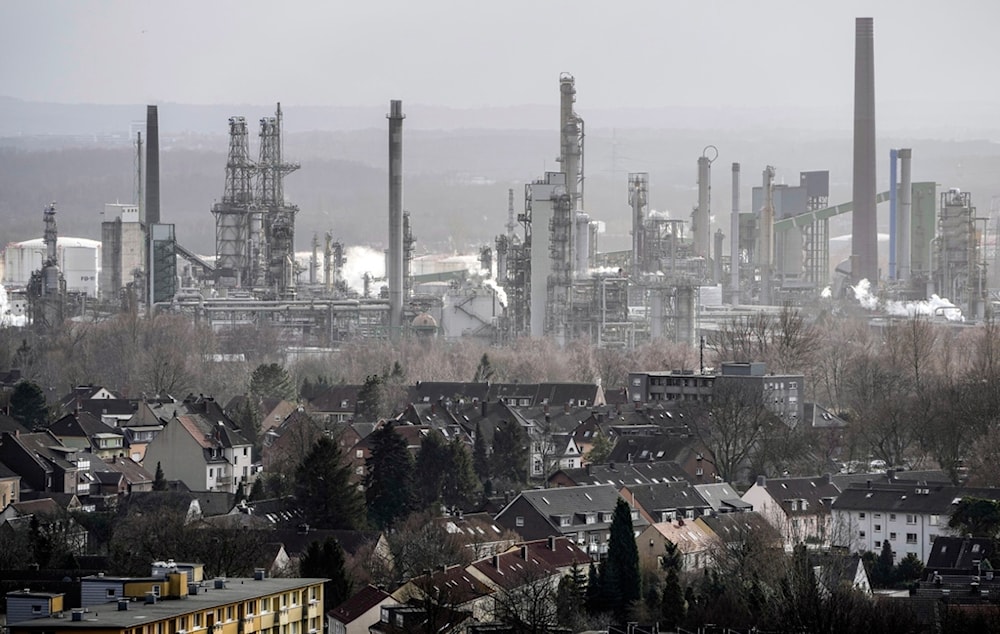German economy shrinks 0.3% in 2023
The Federal Statistics Office reported a 0.3% shrinkage in Gross Domestic Product (GDP) over the full year 2023.
-

Germany's second-largest refinery of BP in Gelsenkirchen, western Germany, on Jan. 30, 2023 (AP)
The German economy faced a contraction in 2023, influenced by persistent inflation, soaring energy prices, and weakened foreign demand. Despite this, it managed to sidestep a recession by the year's end.
The Federal Statistics Office reported a 0.3% shrinkage in Gross Domestic Product (GDP) over the full year 2023, as announced on Monday.
Ruth Brand, President of the statistics office, remarked, "Overall economic development faltered in Germany in 2023 in an environment that continues to be marked by multiple crises."
"Despite recent price declines, prices remained high at all stages in the economic process and put a damper on economic growth," Brand said. "Unfavourable financing conditions due to rising interest rates and weaker domestic and foreign demand also took their toll."
Read more: Eurozone piles economic hazards; Money supply drops, first since 2010
Andrew Kenningham, Chief Europe Economist at Capital Economics, said "The recessionary conditions which have been dragging on since the end of 2022 look set to continue this year."
Despite recent inflation decreases, challenges remain, with declining investment, construction heading for a downturn, and the government implementing sharp fiscal policy adjustments, he added.
While the German economy did not fully recover from the 2020 pandemic-induced slump, ending 2023 with a 0.7% higher GDP than in 2019, there are worries about its overall stagnation since the outbreak of the coronavirus.
Commerzbank's Chief Economist Joerg Kraemer told Reuters, "It is worrying that the German economy has hardly grown at all since the outbreak of the coronavirus."
"This is rare and brings back memories of the years following the bursting of the stock market bubble at the start of the millennium," he added.
Read more: Making sense of a self-induced recession in Europe
Economic performance in industry, excluding construction, experienced a 2.0% decline in 2023, primarily driven by lower production in the energy supply sector. Modest growth of 0.2% was noted in the construction sector, impacted by deteriorating financing conditions, high building costs, and a skilled labor shortage.
Household consumption saw a price-adjusted 0.8% decrease in 2023, and government expenditure fell by 1.7%. Foreign trade faced challenges as well, with imports contracting by 3.0% and exports falling by 1.8%, despite falling prices. However, a positive balance of exports and imports supported overall GDP.
Stagnation in Q4 2023
In the final quarter of 2023, the German economy faced a contraction of 0.3% compared to the previous quarter, narrowly avoiding a technical recession. The euro zone's largest economy had already stagnated in the third quarter, as indicated by the upward revision from the statistics office.
"The risk that 2024 will be another year of recession is high," warned Carsten Brzeski, Global Head of Macro at ING, emphasizing the challenges that may persist into the new year.
"Some take comfort in the fact that the economy is 'only' stuck in stagnation and has avoided a more severe recession. But this should be no reason for any complacency," added Brzeski, urging caution despite the economy currently being in a state of stagnation rather than deeper contraction.
As 2024 begins, the uncertainties surrounding economic performance underscore the need for careful observation and proactive measures to address potential downturns in the coming months.
Read more: Russian billionaires taking funds out of Europe back home: Bloomberg

 4 Min Read
4 Min Read








